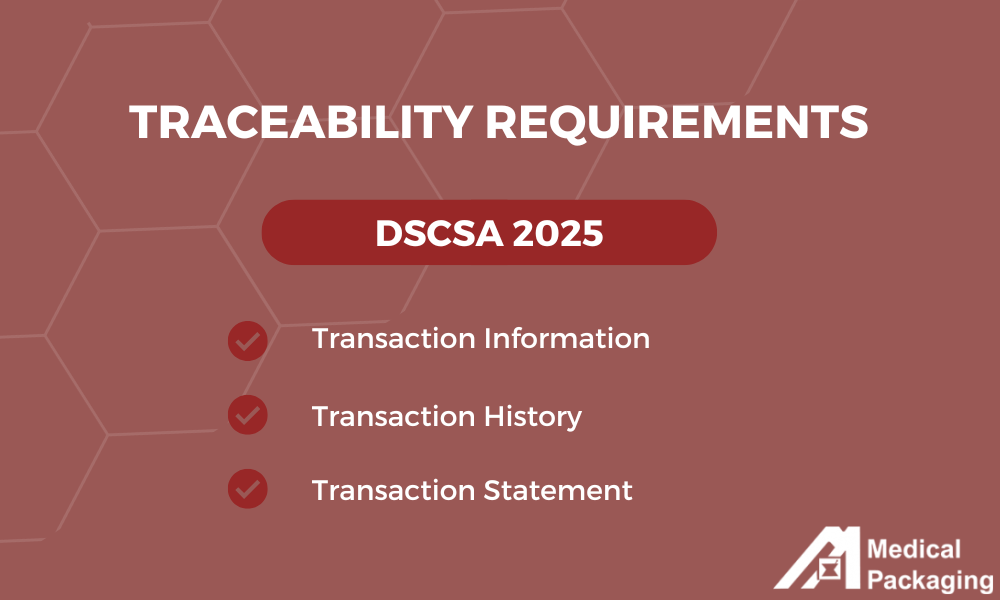The Drug Supply Chain Security Act (DSCSA) became law in 2013 to improve drug supply security and reduce the risk of an illegitimate product entering the healthcare supply chain within the United States. The DSCSA provides the Food and Drug Administration (FDA) with greater authority for regulating and tracking compounded drugs.
The main goal of this law is to keep patients safe from harmful drugs, which include counterfeit medicine. This includes the requirements for product tracing at the package level, affecting stops along the drug lifecycle.
Although it was enacted in 2013, full DSCSA implementation was set to occur in November 2023. In August of 2023, however, the FDA announced “a 1-year stabilization period to accommodate additional time” needed by pharmaceutical supply chain stakeholders. Since then, the deadline has been pushed even further with an additional year into 2025.
The Drug Supply Chain Security Act (DSCSA) new 2025 deadlines are:
- Manufacturers and repackagers: May 27, 2025
- Wholesalers: August 27, 2025
- Larger dispensers: November 27, 2025
With new deadlines set for 2025, manufacturers, wholesale distributors, dispensers, and repackagers are preparing for process and tracking changes.
What Is the Drug Supply Chain Security Act (DSCSA)?
DSCSA Background
The Drug Supply Chain Security Act, enacted in 2013, offers an approach toward improving patient safety and reducing illegitimate products, such as counterfeit prescription drugs, in the pharmaceutical supply chain.
Why was this law introduced?
DSCSA is part of the Drug Quality and Security Act (DQSA). DQSA includes two components, Title I and Title II. Title I was introduced in response to a meningitis outbreak at the New England Compounding Center in 2012, which resulted in 64 deaths, and Title II, established standardized processes for tracking and verifying drugs. Title I is also known as the Compounding Quality Act.
Title II was created to make product tracing easier within the drug supply chain. This includes setting DSCSA regulations on transactional documentation, which is made up of a transaction statement, transaction information, and transaction history. Phase I, all entities along the supply chain began working solely with authorized trading partners and providing necessary documentation to enhance traceability.
As part of Phase I of DSCSA implementation, all supply chain entities are required to work with authorized trading partners only. Each authorized trading partner is required to give a transaction history to the drug manufacturer and be able to respond to federal agencies, state agencies, and other system requests to meet verification requirements for illegitimate products.
Why have the Deadlines Been Postponed?
The new staggered deadlines are due to ongoing challenges in achieving consistent data accuracy and interoperability across the supply chain disruption. These issues are critical to maintaining an uninterrupted drug supply, especially with current shortages in the market. The additional time allows each sector of the supply chain to address data inconsistencies and fully prepare electronic health systems for secure transactions, which should help prevent disruptions in drug distribution and provide a smooth transition.
Main Goals of DSCSA Compliance Requirements
The main goals of DSCSA include improving patient safety, securing the drug supply chain, and minimizing the presence of illegitimate or counterfeit drugs. Key traceability requirements include the following:
- Transaction information: product name, dosage form and strength, container size, transaction date, lot number, number of containers, National Drug Code, and names and addresses of businesses involved in a transfer of ownership.
- Transaction history: electronic statement or paper statement for tracing the transaction information for all previous transactions, including drug manufacturers.
- Transaction statement: a digital statement confirming DQSA compliance from each business transferring ownership of a drug.
Advanced digital interoperability, required under DSCSA, means that trading partners must now transmit this information securely and electronically, a major shift from earlier paper or mixed methods.
Is Your Organization Ready for the DSCSA?
Meeting Updated DSCSA Requirements
Under DSCSA, each pharmaceutical manufacturer, re-packager, wholesale distributor, dispenser or pharmacy, and third-party logistics provider is required to provide transaction information every time a change of ownership occurs. When any of these trading partners has knowledge of a counterfeit or illegitimate product or if there is a recall on pharmaceutical drugs, they must follow certain requirements on how to manage it.
Other requirements of Title II include having the re-packager or drug manufacturer placing enhanced, serialized product information on every package, including the Product NDC number, product lot number, product expiration date, and product serialized numerical identifier or serial number. Re-packagers and pharmaceutical companies are only allowed to sell products to authorized trading partners. Trading partners are also required to verify returns before redistributing drugs, and wholesalers and third-party logistics providers must follow national license standards.
Trading partners and other entities involved in the pharma supply chain have been given additional time since the enactment of DSCSA to become compliant. Confusion over DSCSA implementation has resulted in delays with this compliance. As part of Phase II, DSCSA requires an interoperable system of product tracing at the package level. This electronic system requires the following:
- Interoperable exchange: All authorized trading partners must share transaction statements and information electronically in a secure manner. This information must include the product identifier on individual packages.
- Interoperable verification: Under these verification requirements, trading partners must verify the product identifier at the unit level.
- Interoperable tracing: These serialization requirements call for traceability at the unit level that allows individual products to be tracked and traced at any point in the supply chain. This includes the standardized numerical identifier, lot number, and expiration date.
DSCSA Compliance by Role
DSCSA For Manufacturers
Starting from the top, manufacturers must now fully integrate DSCSA’s digital tracking standards to ensure compliance and safety. Alongside tracking, manufacturers work with other trading partners to ensure that only legitimate products reach patients. MPI’s Pak-EDGE® UD Barcode Labeling Software solution has been upgraded to support enhanced serialization features and new verification capabilities, making it ideal for manufacturers seeking efficient DSCSA compliance tools.
DSCSA For Re-packagers
Like manufacturers, re-packaging companies are a key stop in the process and must retain the same DSCSA compliance to maintain relationships with their stakeholders. These organizations must also have a system for identifying and quarantining suspect or illegitimate products, notifying the FDA and other trading partners, and investigating these products. Re-packagers must affix a product identifier on every package or homogenous case.
Many of MPI’s re-packaging customers are utilizing the FD-Pharma® solution along with MPI-certified materials that meet several compliance factors including cups and lidding, which we will discuss in more detail below.
DSCSA for Wholesale Distributors
Wholesale distributors must meet the same 2025 deadline for tracing. They are expected to verify each product at the package level, which includes the standardized numerical identifier. These distributors must also avoid participating in transactions that involve certain prescription drugs unless these products have product identifiers.
DSCSA For Dispensers/Pharmacies
As the last stop before consumers, pharmacies or “dispensers” play a key role in supply chain security, especially under DSCSA regulations. These businesses are expected to confirm that any entity they conduct transactions with are registered or licensed. Pharmacies must also help trace drug movement through the pharmaceutical supply chain. This involves receiving transactional documentation, storing it, and providing it as needed. Pharmacies are also expected to investigate cases of illegitimate drugs. This involves determining if the drugs in question are illegitimate and making sure patients do not receive these drugs. Pharmacies must notify trading partners and the FDA about illegitimate drugs.
As with the other partners, our Pak-EDGE® software is the solution to comply with DSCSA changes along with our FD-Pharma® for specialty pharmacies.
Compliance Made Easy with MPI
Pak-EDGE® Software for Interoperable Compliance
MPI’s Pak-EDGE® software, now updated for 2025, features enhanced serialization tools for DSCSA compliance. This software, used with most MPI packaging systems, has a built-in serialization feature that allows customers to print individual packages with a unique serial number and barcode, in compliance with DSCSA. The advanced barcode builder adds fields and delimiters to create complex linear or 2D barcodes. These barcodes may include expiration dates and lot numbers or any combination of fields that help an organization comply with tracking regulations. Pak-EDGE® also provides lot traceability for drugs and materials.
FD-Pharma®
The FD-Pharma® is a cost-effective packaging solution for specialty pharmaceutical manufacturers and CDMOs seeking to expand their market base with new and expanded packaging capabilities.
The FD-Pharma® supports clinical trials to early liquid product development and small batch liquid validation runs as well as lower volume full production needs not suited for high-speed packaging lines.
Materials used with the FD-Pharma® system produce FDA-compliant packages and meet several other compliance factors:
Cups
- Meets the requirements of the Food and Drug Administration regulation 21 CFR 177.1520
- Meets USP UV light resistance (Stock colors: Red and Amber)
Lidding
- All lidding is produced per Good Manufacturing Practices and complies with Applicable FDA regulations for most food, beverage, and pharmaceutical product
MPI’s DMF Helps Assist in Compliance
Relying on vendors and sub-vendors to obtain regulatory requirements and technical documents will lead to waiting weeks and months for these critical documents and in some cases, delaying the FDA Filing by our customer. With our own Drug Master File (DMF), we have better control during the process and can help customers with a “Speed to Market” approach. The DMF will also help expedite the application process during a New Drug Application (NDA) or Abbreviated New Drug Filing (ANDA). Click here to read more about MPI’s DMF acceptance.
How to Prepare for the DSCSA 2025 Deadline with MPI
At MPI, we provide a simple solution that can help you prepare for the DSCSA compliance deadline. Our Pak-EDGE® barcode labeling software provides accurate and efficient product labeling to help you meet DSCSA requirements at the package level. The latest version of this software includes more design features, as well as an enhanced label template that can be used to clearly label products with all the required information for tracking and tracing.
If you need more information on how we can help your organization prepare for the upcoming DSCSA compliance deadline, please contact MPI. We can provide you with additional details on our products, including the latest version of our barcode labeling software.
Resources:
Center for Drug Evaluation and Research. “DSCSA Compliance Policies Establish 1-Year Stabilization Period for Im.” U.S. Food and Drug Administration, FDA, www.fda.gov/drugs/drug-safety-and-availability/dscsa-compliance-policies-establish-1-year-stabilization-period-implementing-electronic-systems. Accessed 1 Nov. 2024.
Center for Drug Evaluation and Research. “Drug Supply Chain Security Act (DSCSA).” U.S. Food and Drug Administration, FDA, www.fda.gov/drugs/drug-supply-chain-integrity/drug-supply-chain-security-act-dscsa. Accessed 6 Nov. 2024.
H.R.3204 – 113th Congress (2013-2014): Drug Quality and Security Act | Congress.Gov | Library of Congress, www.congress.gov/bill/113th-congress/house-bill/3204. Accessed 6 Nov. 2024.
“New England Compounding Center Meningitis Outbreak.” Wikipedia, Wikimedia Foundation, 12 Oct. 2024, en.wikipedia.org/wiki/New_England_Compounding_Center_meningitis_outbreak.











